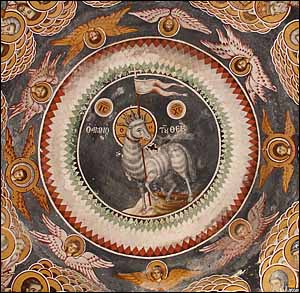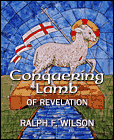
|
Old Testament
New Testament
Gospels
Acts
Paul's Letters
General Letters
Revelation
Topical Studies
Beginning the Journey (for new Christians). en Español

|
Old Testament
New Testament
Gospels
Acts
Paul's Letters
General Letters
Revelation
Topical Studies

|
Home
Bible Studies
Articles
Books
Podcasts
Search
Menu
Donate
About Us
Contact Us
FAQ
Sitemap
Day 17. The Marriage Supper of the Lamb (Revelation 19:6-9)
 Adoration of the lamb (Athon fresco) Fresco of Apocalypse from ceiling of an Athos monastery. |
Satan's forces are reeling. Revelation 17 treats the fall of the Great Prostitute. Revelation 18 consists of a lament over the fall of Babylon, a symbol for the world system that stands opposed to God and his Christ.
Revelation 19 begins with praise: "the loud voice of a great multitude in heaven, crying out, 'Hallelujah!" (Revelation 19:1). God is being exalted for his just and true judgment against the corruption and immorality of the world system, now utterly fallen. Then another cry goes up.
"6 Then I heard what seemed to be
the voice of a great multitude,
like the roar of many waters
and like the sound of mighty peals of thunder, crying out,
'Hallelujah! For the Lord our God the Almighty reigns.
7 Let us rejoice and exult and give him the
glory,
for the marriage of the Lamb has come,
and his Bride has made herself ready.'" (Revelation
19:6-7)
The Lord God Almighty Reigns (Revelation 19:6d-17a)
God has judged the nations, the Lamb has conquered, and now it is time to celebrate. A great multitude in heaven, whom we've seen before, is shouting glory and praises. It is so loud that John compares it to:
- The roar of many waters. If you've ever been near a great waterfall, or a river crashing over rapids at breakneck speed after the spring thaw or on a Pacific Ocean beach with the breakers crashing, then you know what John is talking about. Many football teams don't like to play games held in the Seattle Seahawk's stadium because the fans are notoriously loud. The center can't even hear the quarterback's calls. Loud! Deafening!
- Mighty peals of thunder. If thunder is many miles away, you can still hear it rumbling across the land. But if lightning occurs within a short distance, the thunderclap is instantaneous and deafening.
The multitude is so excited that their cries of praise and glory are booming out through heaven and resounding on the earth.
Here's what they are shouting out:
"6d
Hallelujah!96
For the Lord our God the Almighty reigns.
7
Let us rejoice and exult and give him the
glory...." (Revelation 9:6d-17a)
God's People Are the Bride of Christ
Now we see the focus of this praise and celebration.
"The marriage97 of the Lamb has come,
and his Bride98
has made herself ready." (Revelation 19:8)
The analogy that God's people are his Bride goes far back to the Old Testament prophets.
"Your Maker is your husband, the LORD of hosts is his name." (Isaiah 54:5a)
"And I will betroth you to me forever.
I will betroth you to me in righteousness and in justice,
in steadfast love and in mercy.
I will betroth you to me in faithfulness.
And you shall know the LORD." (Hosea 2:19-20)
99
Paul develops this theme in the New Testament.
"I feel a divine jealousy for you, since I
betrothed you to one husband,
to present you as a pure virgin to Christ." (2 Corinthians 11:2)
"Husbands, love your wives,
as Christ loved the church and gave himself up for her,
that he might sanctify her,
having cleansed her by the washing of water with the word,
so that he might present the church to himself in splendor,
without spot or wrinkle or any such thing,
that she might be holy and without blemish." (Ephesians 5:25-27)
But this theme of the Bride of Christ, the wife of the Lamb, is developed even further in the Book of Revelation.
"And I saw the holy city, new Jerusalem,
coming down out of heaven from God,
prepared as a bride adorned for her husband." (Revelation 21:2)
"Come, I will show you the Bride, the wife of the Lamb." (Revelation 21:9)
"The Spirit and the Bride say, 'Come.'" (Revelation 22:17a)
Jewish Weddings
Jewish weddings were a big celebration, lasting seven days if the family was wealthy enough.100 Jesus' miracle at the wedding celebration in Cana guaranteed that the celebration didn't have to end because they ran out of wine (John 2:1-12). And the marriage of the firstborn Son of the King is a very big deal.
In a typical Jewish wedding, the bride and her party would come from her paternal home to her husband's home to the sounds of music and the distribution of wine and oil and nuts. Everyone would rise to salute the bride and comment on her beauty. Arriving at her husband's home, she is led to her husband and legal documents are signed. Then after the prescribed washing of hands and prayer, the marriage supper begins. The cup is filled and the solemn prayer of bridal benediction spoken over it. And then the feast begins, lasting far into the night, perhaps for a number of days.101
The Bride in Fine Linen, Bright and Pure (Revelation 19:8-9)
Finally, after the oppression of the Antichrist and False Prophet, the wars and judgments, the blasphemies and curses of the fallen world, and the defeat of Satan's forces, it is time for the King's Son to marry.
"7b The marriage of the Lamb has
come,
and his Bride has made herself ready;
8 it was granted her to clothe herself with fine linen, bright102
and pure103
--
for the fine linen is the righteous deeds104
of the saints." (Revelation 19:8-9)
Christ is still titled the Lamb, in recognition that through his sacrifice, he has redeemed all humankind.
All eyes are on the bride, wearing a beautiful white dress that speaks of her purity and holiness. Several phrases round out the description.
The Bride prepares herself.105 You probably know from experience all the ways a bride prepares for the wedding. How carefully the wedding dress is chosen. The veil. The flowers in her bouquet. Everything. So it is with the Bride of Christ, but her preparation is spiritual!
The Bride is allowed to dress in white. I find it interesting that the wording is: "It was granted106 her...." On her own, she didn't deserve to dress in white. Her filthiness, our filthiness is as "filthy rags," Isaiah says.
"We have all become like one who is unclean,
and all our righteous deeds are like a polluted garment." (Isaiah 64:6)
Paul says,
"We all once lived in the passions of our flesh, carrying out the desires of the body and the mind, and were by nature children of wrath, like the rest of mankind." (Ephesians 2:3).
"All have sinned and fall short of the glory of God" (Romans 3:23).
The Bride doesn't deserve to be dressed in white. It is granted to her by grace -- amazing, unlimited, costly grace, paid for by the selfless sacrifice of the Lamb. The linen dress she wears is "fine linen, bright and pure."
The Bride does righteous deeds. Righteous deeds don't save us, but they are an indication that our heart has been changed by God's grace (Ephesians 2:8-10). If no evidence could be found to demonstrate that you are a follower of Christ, perhaps you're not really following, only observing.
The Marriage Supper of the Lamb (Revelation 19:9)
"And the angel said to me, 'Write this: Blessed are those who are invited to the marriage supper107 of the Lamb.' And he said to me, 'These are the true words of God.'" (Revelation 19:9)
 Available in PDF, and Kindle formats, |
If you strictly interpret the Bride-Groom analogy, the invitees can't be the Bride (all the saints), maybe they're angels. But then again, John often mixes his metaphors.
How blessed we are to be so beloved by Christ, that we have been redeemed by him, cleansed, prepared, and wed. United closely and inseparably to the Lamb forever!
Prayer
Thank you, Lord, for the immense privilege of choosing me to be part of the Bride of the Lamb. This honor is undeserved, but granted freely with joyful and abundant grace. Thank you! May I prepare myself now to be clothed in white on that Day when I am united forever to the Lamb! In Jesus' saving name, I pray. Amen.
Day 17 Meditation (Revelation 19:6-9). If now we are
"betrothed" to the Lamb (to use this analogy), why is the "marriage" delayed
until the End of Time? What does the state of being married imply that betrothal
does not? In what sense will that be realized in the New Jerusalem?
https://www.joyfulheart.com/forums/topic/1891-day-17-marriage-supper/
Endnotes
(References and Abbreviations)
[96] "Hallelujah!" is a transliteration of two Hebrew words, hālal, "praise, boast" and "Jah" or "Yah," short for "Yahweh." Praise Yah! Praise Yahweh! Actually, all four of the occurrences of hallelujah in the New Testament are found here in Revelation 19:1-6. The word is also found as a part of the Jewish Hallel prayers. The words hālal and Yah occur together about 24 times in the Hebrew -- all in the Psalms -- usually translated as "Praise the Lord" (Psalm 104:35b; 105:45b; 106:48b; 111:1a; 112:1a; 113:1a; 115:18b; 116:19b; 117:1a; 135:1a; 146:1a, 10; 147:1, 2, 20; 148:1a, b, 7; 14; 149:1a, 9; 150:6 (2x)).
[97] "Marriage" is gamos, a "public ceremony associated with entry into a marriage relationship, wedding celebration" (BDAG 188, 1).
[98] "Bride" is gynē (from which we get the word "gynecology"), "woman," then "wife." Here, "a newly married woman, bride" (BDAG 209, 3).
[99] D.E. Aune, "Bride of Christ," ISBE 1:546. See also 2 Samuel 17:3; Isaiah 49:18; 61:10; 62:5; Jeremiah 2:2, 32; 3:1; etc.
[100] Tobit 11:19; C. S. Keener, "Marriage," Dictionary of New Testament Background (InterVarsity, 2000), sec. 2.4.
[101] Alfred Edersheim, Life and Times of Jesus the Messiah, p. 366.
[102] "Bright" (ESV, NRSV, NIV), "white" (KJV) is lampros (from which we get our word, "lamp"), radiating light, then "pertaining to having a glistening quality," especially of white garments, "bright, shining" (BDAG 585, 3a) .
[103] "Pure" (ESV, NRSV), "clean" (NIV, KJV) is katharos, "pertaining to being clean or free of adulterating matter, clean, pure" (BDAG 489, 1).
[104] "Righteous deeds" is dikaiōma, "an action that meets expectations as to what is right or just, righteous deed" (BDAG 249, 2).
[105] "Made ready" is hetoimazō, "to cause to be ready, put/keep in readiness, prepare" (BDAG 400, b).
[106] Didōmi, "give," here, "to grant by formal action, grant, allow, frequently of God, "grant someone the power or authority, give someone the right," etc. (BDAG 242, 13).
[107] "Supper" is deipnon, "the main meal of the day," then "dinner supper," here, of a formal meal with guests, "feast, dinner" (BDAG 215, bα).
Copyright © 2026, Ralph F. Wilson. <pastor![]() joyfulheart.com> All rights reserved. A single copy of this article is free. Do not put this on a website. See legal, copyright, and reprint information.
joyfulheart.com> All rights reserved. A single copy of this article is free. Do not put this on a website. See legal, copyright, and reprint information.

